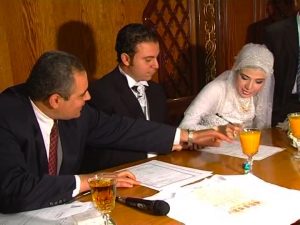Answer
In this counseling answer:
It would be great if you, as their prospective daughter-in-law, talk to your mother-in-law trying to convince her of your viewpoint. If this is not acceptable in your social traditions, you can resort to a member of your family to try to kindly convince them, preferably someone other than your own parents whose speech might be misunderstood by your in-laws.
Answer by Counselor Aliah Azmeh:
Salamu ‘Alaikum Sister,
Thank you for sending us your question. Congratulations on your upcoming marriage! May Allah bless your union and grant you both a strong and fruitful marriage. It seems you and your fiancé agree on how to finance your upcoming wedding ceremony. You have spoken to your parents about it and they support you and your fiancé’s plan. You are worried that your in-laws will not agree to your and your fiancé’s plan because you don’t want them to take it the wrong way like you are disobeying them or disrespecting them. While you certainly cannot control other people’s feelings and actions, you can control the way you approach them and handle the overall situation.
Sister, I would advise that either your fiancé or the both of you sit down with his family and talk about your plan. If you do not have a close relationship with your in-laws yet, then I would advise only your fiancé to speak with his family. Have him discuss how he feels about the expenses and the alternative plan that you both agreed on. Let him speak with his family respectfully and have him explain his good intentions and desire to please them as his parents as well as his desire to take care of his own expenses.
There is no way around it; what will end up happening is that either your fiancé or both of you will have to talk to his family about your new plan. If the message was given to them in a respectful and clear manner, then you have done your part! If they react negatively, then that is not you and your fiancé’s fault. You both must allow yourselves to be human, and human beings anger each other and they are not always perfect. What matters is that you both approach this situation in a respectful and unified way. Don’t be afraid if you disappoint them. That is going to be inevitable. As long as you both approach the subject with respect, clarity, and bravery, then there is nothing you two should feel bad about.
May Allah grant you the courage, respectfulness, and wisdom to overcome this hurdle as well as all difficulties in life.
Answer by OI Researchers, ‘Ask the Scholar’:
Dear sister,
it is really good and wise of you to deal with the matter in this practical approach, which we really commend.
First of all, let us agree that it is not prohibited for parents to spend a big sum of money on their son’s wedding as long as they can afford that and they avoid excessiveness (israf). This is also related mostly to cultures and traditions of each country and community. Meanwhile, we support your viewpoint as Islam, indeed, condemns wasting money on unnecessary things. Hence, it’s un-Islamic and also unwise to spend much money unnecessarily, even if you are rich.
As for convincing your fiancé’s parents, it normally depends on your traditions; can you talk to them yourself? If yes, it would be great if you, as their prospective daughter-in-law, talk to your mother-in-law trying to convince her of your viewpoint. If this is not acceptable in your social traditions, you can resort to a member of your family to try to kindly convince them, preferably someone other than your own parents whose speech might be misunderstood by your in-laws.
However, if your fiancé’s parents insist on their view, you should not make it a big problem. Instead, you should accept it as long it is not a prohibited matter.
May Allah grant a happy and peaceful marital life, ameen.
Allah Almighty knows best.
***
Disclaimer: The conceptualization and recommendations stated in this response are very general and purely based on the limited information provided in the question. In no event shall AboutIslam, its counselors or employees be held liable for any damages that may arise from your decision in the use of our services.
Read more:


